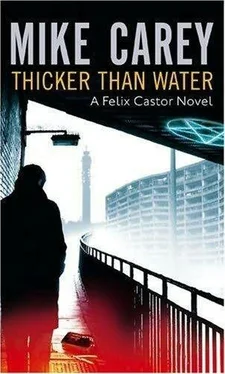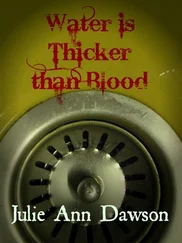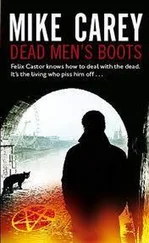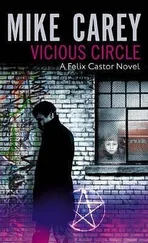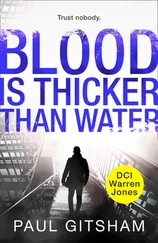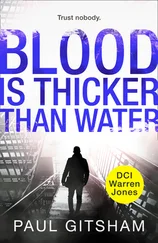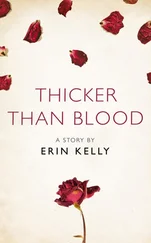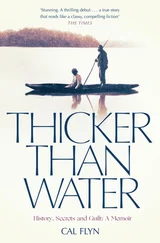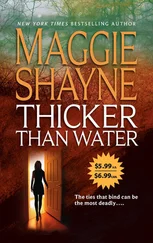‘Now you fucking run!’ he snarled, stepping back quickly. ‘Ready . . . aim . . .’
I don’t know what I would have done on the word ‘fire’: fortunately I never got to find out, because the command never came. Instead, Kenny made a really unlovely noise: a sucking gurgle that cut off before its time and ended on a terrifying silence. His mouth opened and closed and his arms spasmed, as though he was trying to get a good grip on a parcel of a peculiar shape and heft.
He turned around a hundred and eighty degrees, presenting his back to me. There was something odd about it: his shirt was gaping open, split from side to side as though he’d started to turn from Bill Bixby into Lou Ferrigno. And then from within the shirt — filling it miraculously like the endlessly rising bubbles in the plastic trim of an old-fashioned Wurlitzer — blood welled, saturating the cloth in an instant, to spill down his jeans in a lapping tide.
He hadn’t turned around on purpose to show me this: he’d turned to stare at Anita, who was still standing there with a slender length of steel in her hands. It was one that we would have discarded in our hunt because it was far too long and thin to throw. As a makeshift scimitar it clearly had its drawbacks, because Anita’s hands were bloody too, dark red beads sliding down her fingers onto the pale metal. She held Kenny’s gaze as she let go of the steel strip so that it clattered down on the ground between them.
‘Kick the can,’ Anita said, in a very level, very matter-of-fact tone. In the game of the same name, it was the phrase you shouted as you freed all the kids who’d already been caught.
Kenny opened his mouth to answer and vomited a huge amount of dark red blood. Then he collapsed, and Anita fled. Ronnie and Davey made a half-hearted attempt to catch her, but their coordination was shot to hell by the shock of what they’d just seen. She got away clean, and in the mess and chaos that followed so did I.
Like I said earlier, you had to go down through the levels of the factory in convoy unless you had your own torch, so I was stuck with my former tormentors until we were back on terra firma. But the business of lowering Kenny down the ladder and then carrying him in blood-boltered relay from floor to floor occupied so much of the gang’s attention that they paid none at all to me. The game was over in any case, and it had turned out to be a game of two halves with a vengeance.
The relay carried on all the way to the casualty department at Walton hospital, which was right next door to the factory. It turned out later that Anita had cut deep enough with her wild swipe to puncture Kenny’s lung, which had started to deflate. She’d also hit his posterolateral artery, which supplies blood to the spine. The bumps and stresses of Kenny’s forced descent hadn’t helped the situation either, and he was down to four pints of blood by the time the doctors got to him.
He was away from the street for a long time — first of all in intensive care, then on a normal ward, and finally with an aunt way out in Kirkby where his dad sent him to recuperate. All of this was relayed to us by Ronnie and Steven, who without their big brother to make up the trinity were now humble rank-and-filers in the gang. Davey Barlow, the Igor to Kenny’s Frankenstein, faded out around then too, so we experienced something of a renaissance. I remember the rest of that summer as a good time, marred only by the fact that Anita also abandoned the gang after that day, and by occasional letters from Matt that made me resent his absence all the more.
When Kenny did come back, he came back as someone else. His sixteenth birthday had taken place while he was still away from the street, but it was obvious when we saw him walking up Breeze Lane eight months later that he was carrying an unaccustomed weight on his shoulders. He had a job now, at Plunkett’s garage, and a girlfriend out in Kirkby who he visited every Saturday night. He had a context that kept me safe in perpetuity from his vicious streak, like a Walton get-out-of-jail-free card. Grown men didn’t hit kids, unless the kids were their own.
So these were the events that passed in review before my eyes after Basquiat spoke the fateful name. They didn’t come in exactly that order, as a clean and coherent sequence: they were mixed in with a lot of other things. For me, thinking about Liverpool was always like trying to take one tissue out of one of those little hotel-room boxes where the bloody things are interleaved and as thin and fragile as the Turin Shroud: one tug and you take the whole box.
So I also remembered my mum coming home to Liverpool three years later to face my dad down and move in with her former fancy man, Big Terry Lackland. I remembered Matt’s finishing his holy orders and becoming Father Matthew Castor, on a spring day in torrential rain, wearing a rough-hewn but beautiful scrimshaw crucifix that Mum had bought from the pawnshop as his ordination present. I remembered — with confused emotions — my own escape, when I aced my A levels against everyone’s expectations including mine and pissed off to Oxford without a backward glance: the best way to leave, in my experience, if you can make it stick.
And as the cascade reached its inevitable conclusion, I remembered the one Castor who wasn’t around to see all this stuff happen. The one whose death taught me what I was and launched me on my path, bringing me by insensible degrees to this moment and this place.
I remembered Katie.
And the rest was silence, until Gary Coldwood broke it with a blunt question, pulling me by the heels back into the present day.
‘So you and Mister Seddon weren’t on the best of terms?’ he demanded.
I shrugged, as casually as I could manage. ‘It’s not a Batman and Joker thing, Gary,’ I said. ‘It was a hell of a long time ago, and I haven’t seen him since. Haven’t even thought about him.’
‘It’s probably fair to say that he’s thought about you,’ Basquiat pointed out, her tone hard. ‘He painted your name in his blood.’
I shrugged again. ‘Maybe he was starting to write his will,’ I suggested. Well, what the fuck? My conscience was clean, at least as far as attempted murders were concerned. Whatever this looked like, I knew what it wasn’t: it wasn’t The Tell-Tale Heart .
‘You still want to leave this hanging?’ Basquiat asked Coldwood.
Gary shook his head once, brusque and emphatic. ‘No,’ he said. ‘We’ll need to take you in for questioning, Fix, and we’ll need a formal statement. I’m sorry.’ That one hit me before I was ready for it.
‘What about the other seventeen Castors?’ I asked, aghast.
‘They stopped being relevant when you told us you knew this bloke.’
‘So am I being charged?’
Coldwood opened his mouth, but Basquiat’s snarl cut across whatever he was going to say.
‘That would look great in court, wouldn’t it? Invite you down here to read the scene, then arrest you when you get here? No, Castor, you’re just assisting us with our inquiries. Anything else will have to wait until we’ve got the forensics in.’
She was looking at Gary rather than at me as she said all this, and it was clear that there was an unspoken question between them.
‘Under the circumstances, Detective Sergeant Basquiat,’ Coldwood said with clipped formality, ‘I think it advisable that you conduct the interview with Mister Castor. My personal and professional relationship with him probably precludes my being involved in interrogating him or taking a statement from him.’
There was a momentary silence, then Basquiat nodded, seemingly satisfied.
‘But if you’re thinking of having a testicle roast,’ Gary added, ‘then think again.’
‘He’s as safe as if he was in God’s pocket,’ Basquiat promised blandly.
Читать дальше
